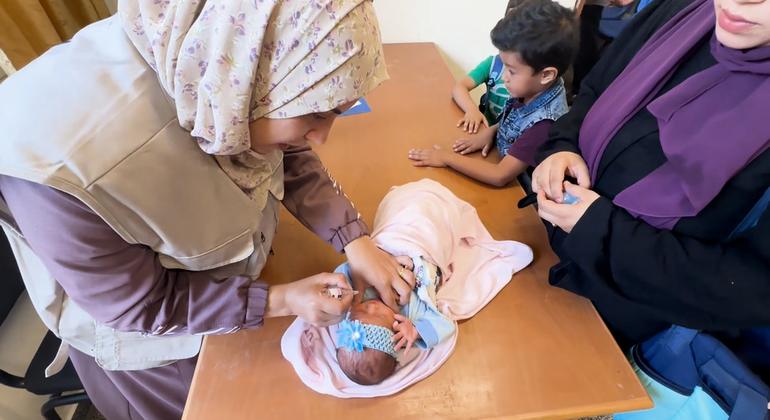Gaza: UN humanitarian agencies move towards polio vaccination target


“We think we will need another day tomorrow to actually complete the entire central area,” said Dr. Rik Peeperkorn. WHO Representing the Occupied Palestinian Territory (OPT).
Speaking from Gaza, he explained that the third day of the operation continued during an eight-hour daily pause as agreed between the Israeli army and Hamas militants.
Each “humanitarian pause” will last from 6:00 a.m. to 3:00 p.m. local time, with the option of extending for an additional day if necessary.
Next rounds
The WHO health official explained that vaccination teams will move into the wider southern region on Thursday for three more days, and most likely on Wednesday, before moving on to the northern region. “Four weeks later, the process will be repeated for the second round of vaccinations,” he added.
Access to the northern part of the Gaza Strip remains a concern, as WHO has been trying to send delegations to the north over the past two weeks to provide hospitals with essential medical supplies.
“Of the eight or nine missions we had planned, only three or four were able to be carried out,” he said. An Emergency Medical Team (EMT) was deployed to the Indonesian Hospital and a pediatrician to Kamal Adwan Hospital along with medicine and other supplies.
The journey back to base included a seven-hour wait to be allowed to proceed to the holding area, plus another 2.5 hours at the checkpoint. Nearly 11 months after the war began, the conflict resolution process has not been effective, Dr. Peeperkorn asserted.
90 percent ratio
According to the UN health agency, at least 90 percent of Palestinian children need to be vaccinated for the campaign to be effective and prevent the spread of polio in Gaza and globally.
The Gaza Strip had high population-wide vaccination coverage before the conflict began in October 2023. Due to the impact of the war, routine vaccination coverage dropped from 99% in 2022 to below 90% in the first quarter of 2024, increasing the risk of vaccine-preventable diseases in children, including polio.
Asked whether other health concerns such as child malnutrition could be assessed while vaccination teams were working, Dr Peeperkorn said there was not enough capacity to do so.
“This is a very intense operation. You want to do it as quickly as possible in as few days as possible. With all the complications in Gaza, we decided that we cannot add anything to this operation. If we see that we can do more operations in the second, four weeks, we will certainly do it.”
The polio vaccination campaign comes amid widespread damage to Gaza’s health infrastructure, including water and sanitation systems, and after health officials detected the first case of polio in Gaza in 25 years, in a 10-month-old baby in a refugee camp. The virus can cause paralysis and even death in young children.
The danger is constant
While UN humanitarian agencies welcomed the humanitarian pause in specific areas to allow for a large-scale polio vaccination campaign, they stressed the urgent need for the immediate release of all remaining hostages and a ceasefire in the Gaza Strip. “Once these children are vaccinated, they will return to areas that we expect to be bombed again in the coming week,” warned James Elder, spokesman for the UN Children’s Fund.UNICEF).
“There is nothing in it, that should be accepted as normal,” he continued. “And I think people now accept that ceasefire talks are just talks so we keep thinking there is hope there.
“After 10 months, we may be a little bit naive. So something has to be done, and again, it has to fall on the leaders who need to represent their people.”


